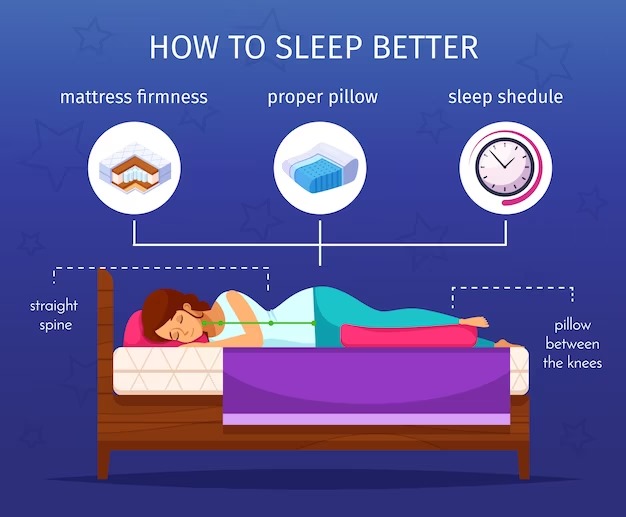In today's fast-paced world, sleep often takes a back seat in the lives of teenagers. Between school, extracurricular activities, socializing, and digital distractions, getting enough rest might seem like a low priority. However, sleep plays a crucial role in the overall well-being and success of teenagers. This comprehensive guide will delve into the importance of sleep for teenagers, providing insights, tips, and expert advice to help them understand why rest is essential for a healthy lifestyle.
The Teenager's Guide to Sleep: Why Rest is Essential
As adolescents undergo various physical and mental changes, their sleep patterns also evolve. Here's a closer look at why quality rest is vital for teenagers:
Understanding the Sleep Cycle: Laying the Foundation
Sleep is a complex process governed by circadian rhythms that regulate the body's internal clock. Teenagers experience a shift in their biological clock, causing them to feel more awake at night. This phenomenon, known as "delayed sleep phase syndrome," can lead to difficulty falling asleep early, often resulting in inadequate sleep.
The Crucial Role of Sleep in Growth and Development
During adolescence, significant growth spurts occur, necessitating ample rest. Growth hormone release primarily occurs during deep sleep stages. Insufficient sleep can hinder this process, potentially affecting a teenager's physical development.
Cognitive Function and Academic Performance
Quality sleep is closely linked to cognitive function and academic success. Sleep facilitates memory consolidation, information processing, and problem-solving abilities. Teenagers who prioritize sleep are better equipped to focus during classes, retain information, and excel in exams.
Emotional Well-being and Mental Health
Sleep and emotional well-being share a bidirectional relationship. While poor sleep can contribute to mood swings and irritability, stress and anxiety can disrupt sleep patterns. Establishing healthy sleep habits can enhance emotional resilience and overall mental health.
Digital Devices: The Sleep Thief
In the age of technology, digital devices like smartphones and computers are ubiquitous. However, the blue light emitted by these devices suppresses the production of melatonin, a sleep-inducing hormone. Limiting screen time before bedtime can improve sleep quality.
Creating a Sleep-Conducive Environment
A conducive sleep environment sets the stage for restful nights. Keep the bedroom cool, dark, and quiet. Comfortable bedding, supportive pillows, and a comfortable mattress contribute to optimal sleep conditions.
Establishing Consistent Sleep Patterns
Erratic sleep schedules can disrupt circadian rhythms. Encourage teenagers to maintain a consistent sleep schedule, even on weekends. This practice helps regulate the body's internal clock and improves sleep quality.
The Pitfalls of Caffeine and Sugar
Limiting caffeine and sugar intake, especially in the afternoon and evening, can aid in falling asleep more easily. These stimulants can interfere with the body's ability to wind down for rest.
Exercise: A Double-Edged Sword
Regular physical activity promotes overall health, but exercising close to bedtime can be counterproductive. Aim for at least two hours of gap between exercise and sleep to avoid overstimulation.
The Power of Napping
Short power naps can provide a quick energy boost during the day, but teenagers should avoid extended naps, as they might interfere with nighttime sleep.
Stress Management Techniques
Stress is a common part of a teenager's life, but chronic stress can disrupt sleep patterns. Encourage stress-reduction techniques such as mindfulness, deep breathing, and journaling to promote better sleep.
Balancing Extracurricular Activities
While extracurricular activities are essential for personal growth, an overloaded schedule can lead to sleep deprivation. Help teenagers strike a balance between their commitments and their need for rest.
The Role of Nutrition
A balanced diet plays a crucial role in sleep quality. Avoid heavy or spicy meals close to bedtime, and consider sleep-promoting foods like bananas, cherries, and warm milk.
Recognizing Sleep Disorders
If sleep issues persist despite implementing healthy sleep habits, it's important to consider the possibility of sleep disorders like insomnia or sleep apnea. Consulting a healthcare professional can provide valuable insights and solutions.
Conclusion: Prioritizing Rest for Success
In the bustling lives of teenagers, sleep often takes a backseat. However, this guide highlights the pivotal role sleep plays in growth, academic success, emotional well-being, and overall health. By following the tips and insights shared here, teenagers can make informed choices to optimize their sleep habits and set the stage for a successful and fulfilling life.








